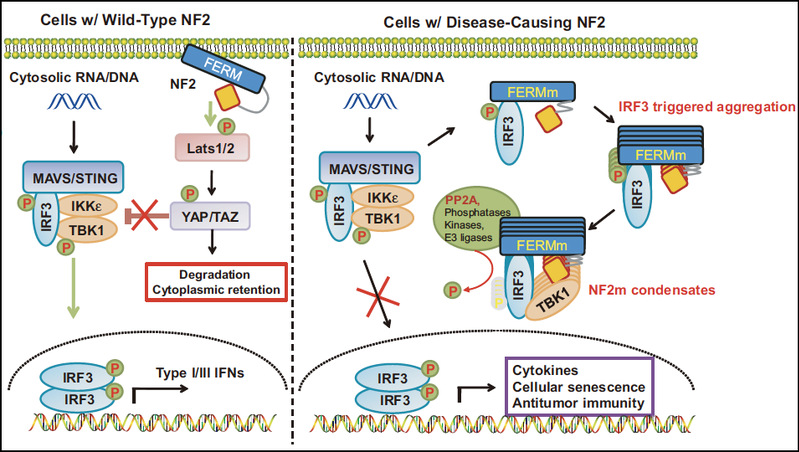On August 27th, 2021, Pinglong Xu laboratory published the research article entitled “Induced phase separation of mutant NF2 imprisons cGAS-STING machinery to abrogate antitumor immunity” in Molecular Cell, which reported phase separation-mediated quiescence of cGAS-STING signaling by a mutant tumor suppressor NF2.
Missense mutations of tumor suppressor Neurofibromin 2 (NF2/Merlin/schwannomin) result in sporadic occurrences of tumorigenesis in organs with various origins. However, the underlying pathogenicity for NF2-related tumors remains incomplete known. Here, we found that NF2 functioned positively to innate immunity via regulating the YAP/TAZ availability. Unexpectedly, the patient-derived individual mutation in the FERM domain of NF2 (NF2m) converted NF2 into a potent suppressor of cGAS-STING signaling. Mechanistically, NF2m gained extreme affinities to IRF3 and TBK1, and upon innate nucleic acid sensing, was directly induced by activated IRF3 to form cellular condensates by which contained the PP2A complex to eliminate TBK1 activation. Accordingly, NF2m robustly suppressed the STING-initiated antitumor immunity in both cancer cell-autonomous and nonautonomous murine models and human vestibular schwannomas. Therefore, our findings report the phase separation-mediated quiescence of cGAS-STING signaling by a mutant tumor suppressor and reveal the gain-of-function pathogenesis for NF2-related tumors via regulating antitumor immunity.

The gain-of-function suppression of cGAS-STING signaling by phase separation of mututant tumor suppressor NF2.
Drs. Fansen Meng, Zhengyang Yu, Dan Zhang, and Shasha Chen in Xu laboratory are the first authors, and Drs. Pinglong Xu and Tingbo Liang are the corresponding authors for this research article. This study was collaborated by Drs. Jun Huang, Jun Qin, Yan Zhang, Songying Ouyang, Xin-Hua Feng, and other colleagues, sponsored by NSFC Projects (31830052 and 31725017 to P.X., and 81802850 to F.M.), the National Postdoctoral Program for Innovative Talents (BX201700210 to F.M. and BX20180270 to Q.Z.), and the Laboratory of Animal Virology of MoA (F.M. and Q.Z.).



